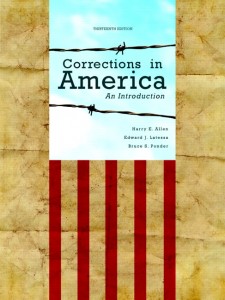Corrections in America: Learning from those who wrote the book
Rarely do students have an opportunity to learn from the textbook writers, but that’s the case at the University of  Louisville (UofL). Dr. Harry E. Allen and Bruce Ponder, faculty members teaching at UofL, along with colleague Dr. Edward J. Latessa at the University of Cincinnati, are now working on the 14th edition of the text for Corrections in America.
Louisville (UofL). Dr. Harry E. Allen and Bruce Ponder, faculty members teaching at UofL, along with colleague Dr. Edward J. Latessa at the University of Cincinnati, are now working on the 14th edition of the text for Corrections in America.
In the always-evolving field of corrections, it’s noteworthy that one thing has stayed the same since the 1970s – the textbook. In fact, Corrections in America is the longest continually published textbook in the field and continues to be the best-selling text in the study of corrections.
The 14th edition continues its established tradition of comprehensive, student-friendly instruction coverage with extensive supplemental study materials. It covers virtually all aspects of corrections, including the history of corrections system, prisons in the present, correctional ideologies, sentencing and legal issues, alternatives to imprisonment, institutional corrections, and correctional clients.
But it’s more than just the variety of subject matter that sets Corrections in America apart. The text has maintained its position in the market because of its adaptability. Like the field of corrections itself, the text has undergone numerous changes over the years, with some editions seeing more revisions than all of the previous editions combined, according to the authors.
The authors also take great pride in reviewing feedback from colleagues across the country and work to balance research and theory with practical and predictive examples included in the text. This helps to make the book both informative and interesting to eager to learn students.
The text is organized in sections ranging from historical perspectives and the justice process to correctional systems and functions and a link to the future, in which the authors offer a look at future trends, innovations and programs that could develop and be expanded. By looking forward, the authors challenge students to become thought leaders in their chosen field and think about the sustainability of the corrections environment.
The University of Louisville is a research-based public institution for higher learning widely recognized for its contribution to exploration and innovation in various fields, and Allen and Ponder are a great example of dedication and participation to the progress of the correction field. In addition to their research, the duo will also teach their course online this coming spring, presenting an opportunity for students, both near and far, to gain valuable knowledge and skills in this area of interest.
Naturally, “Corrections in America” 14th edition is the textbook supporting the course JA 202 (Corrections in the U.S.) in the Justice Administration degree program at UofL. The online delivery method allows for students to learn at a time that’s convenient for their schedule and in the comfort of their own home.
The course JA 202 presents an introduction to the history, practices, and issues related to the correctional function in American criminal justice. As with the textbook, topics in the course range from the history of prisons to inmate subcultures and institutions to correctional issues such as overcrowding, stress, sexual violence, and administrative problems. Allen and Ponder note that both adult and juvenile corrections are covered in the course, just like the text.
Learn more about the Corrections in America by visiting http://louisville.edu/justice/about-us/faculty-research. To apply and enroll to the criminal justice degrees at bachelor’s and master’s levels offered online at the University of Louisville, please visit Louisville.edu/online.
